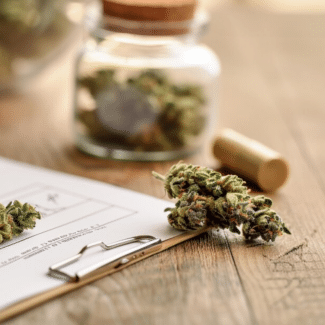How to Get a Cannabis License in Rhode Island
This guide provides essential information on obtaining a cannabis license in Rhode Island, outlining the necessary steps, requirements, and compliance measures involved in the licensing process. It emphasizes the importance of thorough research, careful documentation, and adherence to state regulations to successfully navigate the burgeoning cannabis industry.

A cannabis business in Rhode Island can sound intriguing. With the growing acceptance and legalization of cannabis, it’s an exciting time to enter the industry. Rhode Island is one of the states that has legalized both medical and recreational marijuana.
The cannabis industry is projected to create over 5,000 jobs and generate $1 billion in annual sales in Rhode Island by 2025.
If you want to be a part of this thriving market, read on to learn how to obtain a cannabis license in Rhode Island.
Regulatory Landscape Rhode Island Cannabis Licenses
In Rhode Island, the legal landscape for cannabis licenses primarily focuses on medical cannabis rather than recreational use.
The regulatory body responsible for overseeing the issuance of cannabis licenses is the Rhode Island Department of Business Regulation (DBR). They have established the Office of Cannabis Regulation to manage the licensing process.
Rhode Island offers various licenses, including cultivation, processing, testing, and retail rights. These licenses allow businesses to engage in activities such as growing cannabis, manufacturing products, conducting quality testing, and selling cannabis to registered patients.
Each license type has its own requirements and regulations that applicants must comply with to obtain a license.
For the most up-to-date and accurate information, it is advisable to visit the official website of the Rhode Island Department of Business Regulation or consult legal professionals familiar with the state’s cannabis laws.
Research and Prepare
To successfully obtain a cannabis license in Rhode Island, conducting thorough research and preparation is crucial. Here are some steps to consider:
- Research Requirements: Research the specific requirements and criteria for obtaining a cannabis license in Rhode Island. This includes understanding the regulations, restrictions, and any prerequisites the state sets.
- Eligibility Criteria: Determine the eligibility criteria for obtaining a cannabis license. This may include residency requirements, age restrictions, and background checks. Ensure you meet all the qualifications before proceeding with the application process.
- Application Timeline: Familiarize yourself with the application timeline in Rhode Island. Understand when the application period opens and closes, and plan your preparations accordingly. Keep track of any important dates, deadlines, or updates provided by the regulatory authorities.
- Associated Fees: Be aware of the associated fees for applying for a cannabis license in Rhode Island. The average application fee for a medical cannabis cultivator license is around $25,000. There may be licensing fees, renewal fees, and other costs associated with maintaining the license.
- Compliance and Documentation: Ensure you have all the necessary documentation and comply with the regulations. This may include business plans, financial statements, security plans, and other supporting documents specified by the Rhode Island Department of Business Regulation.
- Seek Professional Guidance: Consider consulting legal professionals or experts with experience in the cannabis industry and Rhode Island’s regulatory framework. They can provide valuable guidance, help navigate the application process, and ensure state regulations compliance.
Note: Remember to regularly check Rhode Island Department of Business Regulation for the most up-to-date information, forms, and guidelines regarding cannabis licenses.
Develop a Solid Business Plan
Developing a solid business plan is crucial when applying for a cannabis license in Rhode Island. It is important to create a comprehensive business plan that is specifically tailored to the Rhode Island cannabis market.
This entails conducting thorough market analysis, understanding customer demographics, and assessing the competitive landscape.
Key elements to include in the business plan are financial projections, operational strategies, security measures, and compliance strategies. It is advisable to seek vital insurance plans or consulting services to ensure your business plan meets the specific requirements of the licensing authorities in Rhode Island.
Professionals with expertise in the cannabis industry and knowledge of Rhode Island’s regulatory framework can provide valuable insights and guidance to help you create an effective and compliant business plan.
Assemble the Necessary Documentation
When applying for a cannabis license in Rhode Island, assembling the necessary documentation to support your application is crucial. Here is a checklist of required documents specific to Rhode Island:
- Proof of Identification and Residency: Provide copies of identification documents to establish your identity, such as a driver’s license or passport. Additionally, demonstrate residency in Rhode Island through documents like utility bills or lease agreements.
- Financial Stability and Funding Sources: Prepare financial statements, including bank statements and tax returns, to demonstrate your financial stability. Provide documentation outlining your funding sources, whether personal investments, loans, or partnerships.
- Property and Lease Agreements: Provide property ownership documents or lease agreements for your intended business location if applicable. Ensure that the property or lease agreement complies with Rhode Island’s regulations for cannabis businesses.
- Security Plans and Measures: Develop comprehensive security plans that meet Rhode Island’s standards. This may include detailed layouts of security systems, alarm systems, surveillance cameras, and access control measures to ensure the safety and integrity of your facility.
- Standard Operating Procedures (SOPs): Prepare SOPs specific to your intended cannabis operations, whether it’s cultivation, manufacturing, or retail. These SOPs should outline your processes, including cultivation techniques, manufacturing procedures, quality control, and inventory management, ensuring compliance with Rhode Island regulations.
- Employment and Labor Compliance Documents: Ensure you have employment and labor compliance documents specific to Rhode Island. This may include documents such as employee agreements, job descriptions, and protocols for fair employment practices.
Note: Remember to review the official guidelines and requirements provided by the Rhode Island Department of Business Regulation to ensure you have all the necessary documentation for a successful cannabis license application.
Submitting the Application
When it comes to submitting the application for a cannabis license in Rhode Island, attention to detail and accuracy are essential. Here’s a guide to help you through the process:
- Review the Application: Carefully read and understand the application form provided by the Rhode Island Department of Business Regulation. Take note of any specific instructions, required documents, and submission deadlines.
- Complete the Application Form: Fill out the application form accurately and thoroughly. Provide all the requested information, ensuring that it aligns with the supporting documents and requirements outlined by the regulatory authorities.
- Double-Check for Accuracy: Review your application multiple times to ensure accuracy and consistency. Any errors or omissions may delay the processing of your application or lead to rejection. Pay close attention to details such as contact information, financial figures, and compliance-related questions.
- Include Supporting Documentation: Compile and attach all the required supporting documents as outlined in the application guidelines. Make sure the documents are organized and clearly labeled. Consider including a cover letter summarizing your qualifications, experience, and commitment to compliance and responsible operations in the Rhode Island cannabis market.
- Seek Professional Review: Consider having your application and supporting documents reviewed by professionals or legal experts with knowledge of Rhode Island’s cannabis industry. Their insights and expertise can help identify any areas for improvement and ensure that your application is compelling and meets the specific requirements.
- Adhere to Submission Deadlines: Submit your application before the designated deadline. Late submissions may not be accepted, so it’s important to plan and allocate sufficient time to complete and review the application thoroughly.
- Maintain Communication: Stay in touch with the Rhode Island Department of Business Regulation or any designated contact person regarding the status of your application. Address any requests for additional information promptly and professionally.
Note: Remember, each application is unique, and there is no guaranteed outcome. However, by preparing a comprehensive and compelling application that showcases your qualifications, experience, and commitment to compliance, you increase your chances of obtaining a cannabis license in Rhode Island.
Application Review and Compliance Inspection
After submitting your cannabis license application in Rhode Island, there is typically a timeline for application review and compliance inspections. The specific duration may vary, but it is important to maintain ongoing communication with the licensing authorities during this process.
Promptly respond to any inquiries or requests for additional information to ensure a smooth review process. It is also crucial to prepare for compliance inspections by familiarizing yourself with Rhode Island’s regulations and requirements.
Ensure that your operations, facilities, and documentation are in compliance to navigate inspections successfully. Regular self-audits and adherence to regulatory standards will contribute to a positive outcome during inspections.
Remaining Compliant with Rhode Island Regulations
Remaining compliant with Rhode Island regulations is crucial for maintaining a cannabis license. Ongoing compliance demonstrates your commitment to operating responsibly within the state. Common compliance requirements in Rhode Island include record-keeping, security measures, product testing, and labeling.
It is essential to establish robust compliance protocols that align with Rhode Island regulations and regularly review and update them as needed. Stay informed about any regulatory updates or changes by regularly monitoring the Rhode Island Department of Business Regulation’s communications.
Conclusion
Obtaining a cannabis license in Rhode Island requires thorough research, careful planning, and strict adherence to regulations.
By understanding the state’s regulatory landscape, assembling the necessary documentation, and developing a solid business plan, you can increase your chances of success.
Submitting a complete and accurate application, maintaining ongoing communication, and preparing for compliance inspections are crucial steps in the licensing process.
Once licensed, it is essential to remain compliant with Rhode Island’s regulations, keeping up with any updates or changes.
Sources
- https://www.forbes.com/sites/ajherrington/2022/02/23/new-cannabis-jobs-report-reveals-marijuana-industrys-explosive-employment-growth/
- https://dbr.ri.gov/
- https://cannalawsolutions.com/rhode-island-cannabis-licenses/
- https://www.cannabisbusinesstimes.com/news/state-state-guide-marijuana-application-licensing-fees/
- https://cannalawsolutions.com/rhode-island-cannabis-business-formation/
- https://dbr.ri.gov/office-cannabis-regulation/applications-and-forms




